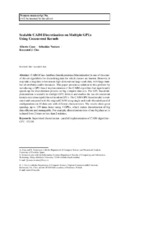Mostrar el registro sencillo del ítem
Scalable CAIM Discretization on Multiple GPUs Using Concurrent Kernels
| dc.contributor.author | Cano, Alberto | |
| dc.contributor.author | Ventura Soto, S. | |
| dc.contributor.author | Cios, Krzysztof J. | |
| dc.date.accessioned | 2017-01-19T13:15:02Z | |
| dc.date.available | 2017-01-19T13:15:02Z | |
| dc.date.issued | 2017 | |
| dc.identifier.uri | http://hdl.handle.net/10396/14346 | |
| dc.description.abstract | CAIM(Class-Attribute InterdependenceMaximization) is one of the stateof- the-art algorithms for discretizing data for which classes are known. However, it may take a long time when run on high-dimensional large-scale data, with large number of attributes and/or instances. This paper presents a solution to this problem by introducing a GPU-based implementation of the CAIM algorithm that significantly speeds up the discretization process on big complex data sets. The GPU-based implementation is scalable to multiple GPU devices and enables the use of concurrent kernels execution capabilities ofmodernGPUs. The CAIMGPU-basedmodel is evaluated and compared with the original CAIM using single and multi-threaded parallel configurations on 40 data sets with different characteristics. The results show great speedup, up to 139 times faster using 4 GPUs, which makes discretization of big data efficient and manageable. For example, discretization time of one big data set is reduced from 2 hours to less than 2 minutes | es_ES |
| dc.format.mimetype | application/pdf | es_ES |
| dc.language.iso | eng | es_ES |
| dc.rights | https://creativecommons.org/licenses/by-nc-nd/4.0/ | es_ES |
| dc.subject | Supervised discretization | es_ES |
| dc.subject | Parallel implementation of CAIM algorithm | es_ES |
| dc.subject | GPU | es_ES |
| dc.subject | CUDA | es_ES |
| dc.title | Scalable CAIM Discretization on Multiple GPUs Using Concurrent Kernels | es_ES |
| dc.type | info:eu-repo/semantics/preprint | es_ES |
| dc.relation.projectID | Gobierno de España. TIN-2011-22408 (SV) | es_ES |
| dc.relation.projectID | Gobierno de España. FPU AP2010-0042 (AC) | es_ES |
| dc.relation.projectID | 1R01HD056235-01A1 (KJC) | es_ES |
| dc.rights.accessRights | info:eu-repo/semantics/openAccess | es_ES |

